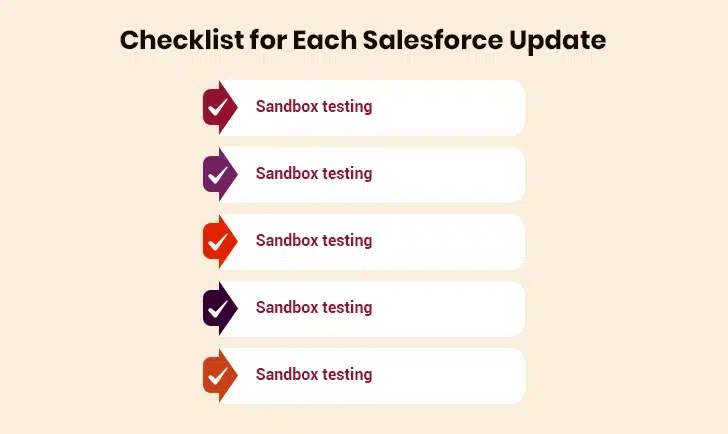There’s no dearth of companies using Salesforce CRM these days. The CRM has top-notch capabilities to boost the output of the marketing, sales, and customer service departments of an organization. But to tap into its full potential, it is important to maintain and update the CRM regularly. Many businesses invest heavily in the implementation and customization of Salesforce but skimp on optimization and upgrades. This leads to compliance issues, performance challenges, backlogged projects, unrealized ROI, a complex IT environment, and difficulty in adapting to new technology.
Salesforce Managed Services offer ongoing support and maintenance to keep the Salesforce CRM functioning effectively and in sync with the organization’s evolving needs. Think of it as an extended dedicated and skilled team of your Salesforce or IT team that is just a call away and provides services at lesser costs. Businesses don’t have to go through the hassles of hiring, managing, or retaining professionals.
Many organizations lack the in-house resources or skill depth to regularly review and optimize their CRM. They struggle to incorporate enhancements to it and modernize it as new releases are introduced. Sometimes, the existing resources lack the knowledge to address complex and critical issues related to the Salesforce system. Managed services for Salesforce address these problems and provide a proactive approach to help businesses run and manage their Salesforce CRM smoothly and effectively. The services include multiple activities, ranging from consulting and deployment to providing expert resources and blocked hours. They help prevent issues early on, ensuring they do not impact critical business operations.
Table of Contents
How Are Salesforce Managed Services Advantageous for Your Business?
- Cohesive Customer-Focused Strategy
- Lesser Burden on IT Team
- Seamless Support
- Proactiveness
- Cost-Effectiveness
- Robust Scalability
- Address the Skill Gap
- Improved Reporting
How Are Salesforce Managed Services Advantageous for Your Business?
Salesforce managed services are not just limited to fixing issues. They enhance the overall performance of the entire CRM system over time. These services bring consistency, expert oversight, and flexibility to businesses that rely on Salesforce for growth.
1. Cohesive Customer-Focused Strategy
Factors like vague strategies, a lack of proper processes, and executive engagements can lead to Salesforce failure. The best method to achieve long-term business goals is to have a Salesforce managed services partner or third-party evaluate your business. This helps businesses develop essential recommendations to maximize the benefits of the CRM.
When a managed services provider reviews the processes from a fresh perspective, it becomes easier to align Salesforce functions with business outcomes. Strategy tweaks can improve how leads are tracked, customers are nurtured, and data is interpreted. A good partner doesn’t just fix what’s broken; they futureproof it. This strategy-driven approach often uncovers hidden inefficiencies and unexplored growth areas. With help from Salesforce consulting and support experts, businesses can build workflows that support both current and future needs. It helps companies to sharpen their focus, clear the clutter, and create a customer path that actually leads somewhere.
2. Lesser Burden on IT Team
Salesforce managed support services identify and handle IT risks efficiently. The team acts as an extended part of the technology team, so businesses do not need to appoint a designated IT professional. This enables the in-house IT team to implement more efficient processes and deliver other critical projects more quickly.
Instead of burning cycles on fixing minor bugs or patching unexpected glitches, internal teams can shift energy toward innovation. CRM managed services fill in the gaps, especially when workload surges or a tricky technical issue arises without warning. They offer calm in the chaos, turning Salesforce problems into routine to-dos. For companies scaling fast, that backup can feel like a secret weapon. These services also bring in Salesforce optimization services that fine-tune the platform over time. The result is a team that feels supported, not stretched thin. Let’s explore how managed services reduce IT pressure:
| Area | Without Managed Services | With Managed Services |
|---|---|---|
| System Upgrades | Time-consuming and delayed | Handled with no downtime |
| Issue Resolution | Slow and error-prone | Quick and expert-led |
| Admin Tasks | Handled manually | Deleted to specialists |
| Resource Planning | Always in firefighting mode | Focused and balanced |
3. Seamless Support
Managed services take into consideration the regular updates launched by the three Salesforce releases every year. The updates are handled without disrupting ongoing business processes.
Each Salesforce release brings new features, functionalities, or changes that can affect current workflows. With Salesforce managed support services, these updates are reviewed, tested, and implemented, if required, in a controlled manner. Support partners ensure new features are rolled out safely, and employees understand how to use them. Even small configuration shifts can create big ripples, so managed services step in early to prevent confusion. These providers follow a basic checklist to ensure structured release management.
4. Proactiveness
Managed services offer best practices that enhance operational efficiency and security. Users have the leverage to utilize innovative ideas that help them prepare for critical scenarios. Businesses learn to recognize high-risk areas before releases and receive fixes for configuration issues.
But proactiveness goes beyond maintenance. Managed services anticipate challenges before they become roadblocks. This can involve identifying patterns in user behavior or detecting data irregularities that indicate larger issues. It’s the difference between plugging leaks and building stronger pipes. Salesforce optimization services are often utilized to proactively enhance system speed, reporting accuracy, and compliance readiness.
Optimize your Salesforce operations and maximize returns with our tailored managed services.
5. Cost-Effectiveness
“CEOs and executive teams around the world are laser focused on delivering success now by connecting with their customers in new, simpler and more cost-effective ways. The investments they make now will determine their success today and for the next decade.”– David Schmaier, Salesforce President and Chief Product Officer.
Hiring a team for Salesforce managed support services saves both time and money. It removes the need to hire, recruit, onboard, train, or retain in-house professionals. Offshore-based resources further reduce the overall program cost of labor arbitrage, boosting the return on your Salesforce investment.
However, cost-effectiveness extends beyond simply cutting expenses. It’s also about making smart use of resources. CRM managed services give budget-friendly access to top-level skills that are often expensive or hard to find.
Here’s what cost-effectiveness looks like in action:
- Predictable monthly costs
- Lower chance of unexpected tech expenses
- Fewer outages and faster issue resolution
- Leaner internal teams with higher efficiency
- No long-term hiring commitments
- Support that grows or shrinks based on demand
To better understand how the cost benefits of Salesforce managed support services stack up against traditional in-house staffing, here’s a quick comparison:
| Factor | Managed Services | In-House Staffing |
|---|---|---|
| Hiring and Onboarding | No recruitment, training, or onboarding needed | Requires hiring, onboarding, and training budgets |
| Operational Costs | Included in service fee | Additional costs for workspace, systems, and tools |
| Scalability Costs | Scales up or down by adjusting contract terms | Scaling means new hires or internal restructuring |
6. Robust Scalability
As organizations grow, their goals and vision evolve. Scalability is crucial in these cases. For instance, there may be a case or project requiring a new product launch. Such kinds of requirements generate the need for new Salesforce workflows. Or maybe expansion into a new region requires additional user roles or compliance features.
Salesforce managed services help make scaling smooth and fast. Instead of scrambling to hire or train, businesses can request the exact help they need. It’s like having a digital backbone that flexes, not snaps, as new opportunities arise. After all, scaling smart means growing without friction.
The model of managed services allows businesses to receive additional support and assistance without having to hire or re-hire resources. Businesses don’t have to worry about outrunning the tools or resources during Salesforce CRM optimization. Only the contract needs to be updated while the provider handles everything else.
7. Address The Skill Gap
Skill gaps don’t just slow things down; they open cracks in security, reporting, and performance. CRM managed services remove those risks by placing niche experts where they’re needed, when they’re needed. These experts already know best practices, common pitfalls, and how to avoid tech rabbit holes. With Salesforce consulting, businesses can roll out advanced features such as automation, AI tools, or deep integrations. Everything from sandbox testing to API configuration becomes manageable. The focus shifts from patching problems to improving outcomes. A well-placed expert can turn a frustrating task into a 30-minute solution.
8. Improved Reporting
“What gets measured gets managed—even when it’s pointless to measure and manage it, and even if it harms the purpose of the organization to do so.” – Peter Drucker, Management Consultant and Author.
Data without insight is just noise. Managed services enhance Salesforce reports and dashboards to make metrics meaningful. Real-time views help leaders make smarter decisions and see results without digging through clutter.
Managed services streamline how data is collected, cleaned, and displayed. Outdated reports are replaced with dynamic visuals that tell a clearer story. Whether it’s pipeline health, team productivity, or customer satisfaction, data becomes more than numbers. With Salesforce optimization, reporting becomes a true decision-making tool.
Is Salesforce CRM Managed Services a Fit for Your Business? Pros & Cons to Consider
Does Your Business Need Salesforce Managed Services?
If the in-house team can meet the experience criteria of Salesforce, you can have faith that your Salesforce instance is in the right hands. Nevertheless, some signs can let you know if you need Salesforce managed services for your business:
- Your current Salesforce administrator is not able to efficiently maintain your Salesforce instances and you require a dedicated team of experts or a resource that has a broad understanding and experience of Salesforce
- Your IT costs are increasing exponentially, and you are not able to estimate what it can cost you every month
- It is vital for you to focus on strategic growth as your business is growing
- You understand that your team is unprepared for any phishing attack as there is no effective data management to take care of thing
- Your precious company time is getting spent micromanaging your in-house team and you are not able to concentrate on core aspects of sales and marketing
Summing up
When businesses hire a Salesforce managed services partner, they get access to specialized expertise as and when they need it. They just need to mention your requirements to get access to experts who are well-versed in that particular area. This way the teams can concentrate on aspects of the organization that need more time and attention.
FAQs
Q. What are the common pitfalls to avoid during Salesforce CRM implementation?
A. Rushing implementation is a top mistake. Also common are unclear goals, inadequate user training, and excessive customization. Many businesses skip data cleanup, which later creates chaos. It’s smart to bring in Salesforce consulting and support early to avoid messy detours. A slow and steady rollout beats a quick crash every time.
Q. What are the top advantages of hiring a Salesforce managed services provider?
A. Top perks include expert support, lower IT costs, and faster issue resolution. Managed services providers also bring strategic guidance and customizations that boost productivity. Businesses gain access to specialized skills on demand, eliminating hiring headaches.
Q. How do Salesforce managed services ensure my CRM stays updated and secure?
A. Managed services providers handle Salesforce’s regular updates and maintain customizations. Security checks, access controls, and backup reviews happen routinely. Managed services utilize best practices to prevent issues before they arise.
Q. When should a business consider Salesforce managed services over hiring an in-house administrator?
A. Managed services make sense when internal skills are lacking or costs become excessive. They’re also ideal when scaling fast, dealing with complex customizations, or managing multiple integrations. If CRM issues keep piling up or tech debt keeps growing, it’s time to call for backup.







